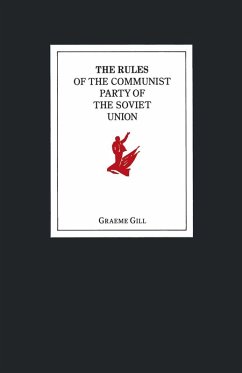Michael Byers
Custom, Power and the Power of Rules (eBook, PDF)
International Relations and Customary International Law
34,95 €
34,95 €
inkl. MwSt.
Sofort per Download lieferbar

17 °P sammeln
34,95 €
Als Download kaufen

34,95 €
inkl. MwSt.
Sofort per Download lieferbar

17 °P sammeln
Jetzt verschenken
Alle Infos zum eBook verschenken
34,95 €
inkl. MwSt.
Sofort per Download lieferbar
Alle Infos zum eBook verschenken

17 °P sammeln
Michael Byers
Custom, Power and the Power of Rules (eBook, PDF)
International Relations and Customary International Law
- Format: PDF
- Merkliste
- Auf die Merkliste
- Bewerten Bewerten
- Teilen
- Produkt teilen
- Produkterinnerung
- Produkterinnerung

Bitte loggen Sie sich zunächst in Ihr Kundenkonto ein oder registrieren Sie sich bei
bücher.de, um das eBook-Abo tolino select nutzen zu können.
Hier können Sie sich einloggen
Hier können Sie sich einloggen
Sie sind bereits eingeloggt. Klicken Sie auf 2. tolino select Abo, um fortzufahren.

Bitte loggen Sie sich zunächst in Ihr Kundenkonto ein oder registrieren Sie sich bei bücher.de, um das eBook-Abo tolino select nutzen zu können.
This book sets out to explain the most foundational aspect of international law in international relations terms. By doing so it goes straight to the central problem of international law - that although legally speaking all states are equal, socially speaking they clearly are not. As such it is an ambitious and controversial book which will be of interest to all international relations scholars and students and practitioners of international law.
- Geräte: PC
- mit Kopierschutz
- eBook Hilfe
- Größe: 1.62MB
- FamilySharing(5)
Andere Kunden interessierten sich auch für
![Playing by the Informal Rules (eBook, PDF) Playing by the Informal Rules (eBook, PDF)]() Yao LiPlaying by the Informal Rules (eBook, PDF)78,95 €
Yao LiPlaying by the Informal Rules (eBook, PDF)78,95 €![Rules for the Global Economy (eBook, PDF) Rules for the Global Economy (eBook, PDF)]() Horst SiebertRules for the Global Economy (eBook, PDF)18,95 €
Horst SiebertRules for the Global Economy (eBook, PDF)18,95 €![Rules of Origin in ASEAN (eBook, PDF) Rules of Origin in ASEAN (eBook, PDF)]() Stefano InamaRules of Origin in ASEAN (eBook, PDF)44,95 €
Stefano InamaRules of Origin in ASEAN (eBook, PDF)44,95 €![Making and Bending International Rules (eBook, PDF) Making and Bending International Rules (eBook, PDF)]() Krzysztof J. PelcMaking and Bending International Rules (eBook, PDF)23,95 €
Krzysztof J. PelcMaking and Bending International Rules (eBook, PDF)23,95 €![Rules for the World (eBook, PDF) Rules for the World (eBook, PDF)]() Michael BarnettRules for the World (eBook, PDF)86,95 €
Michael BarnettRules for the World (eBook, PDF)86,95 €![The Taking of Documentary Evidence in International Arbitration under the IBA Rules (eBook, PDF) The Taking of Documentary Evidence in International Arbitration under the IBA Rules (eBook, PDF)]() Amr SaiedThe Taking of Documentary Evidence in International Arbitration under the IBA Rules (eBook, PDF)39,99 €
Amr SaiedThe Taking of Documentary Evidence in International Arbitration under the IBA Rules (eBook, PDF)39,99 €![The Rules of the Communist Party of the Soviet Union (eBook, PDF) The Rules of the Communist Party of the Soviet Union (eBook, PDF)]() The Rules of the Communist Party of the Soviet Union (eBook, PDF)38,95 €
The Rules of the Communist Party of the Soviet Union (eBook, PDF)38,95 €-
-
-
This book sets out to explain the most foundational aspect of international law in international relations terms. By doing so it goes straight to the central problem of international law - that although legally speaking all states are equal, socially speaking they clearly are not. As such it is an ambitious and controversial book which will be of interest to all international relations scholars and students and practitioners of international law.
Dieser Download kann aus rechtlichen Gründen nur mit Rechnungsadresse in A, B, BG, CY, CZ, D, DK, EW, E, FIN, F, GR, HR, H, IRL, I, LT, L, LR, M, NL, PL, P, R, S, SLO, SK ausgeliefert werden.
Produktdetails
- Produktdetails
- Verlag: Cambridge University Press
- Erscheinungstermin: 11. März 1999
- Englisch
- ISBN-13: 9780511035944
- Artikelnr.: 38214013
- Verlag: Cambridge University Press
- Erscheinungstermin: 11. März 1999
- Englisch
- ISBN-13: 9780511035944
- Artikelnr.: 38214013
- Herstellerkennzeichnung Die Herstellerinformationen sind derzeit nicht verfügbar.
Part I: 1. Law and power
2. Law and international relations
3. Power and the international law
(i) Power and the debate about whether resolutions and declarations constitute state practice
(ii) Power and the scope of international human rights
C. Power and critical legal scholarship
(iii) Power as a threat to international law?
Part II: 4. The principle of jurisdiction
(i) Jurisdiction and customary international law
1. Internal rules
2. Boundary rules
3. External rules
(ii). Jurisdiction by analogy
5. The principle of personality (i) Diplomatic protection
(ii) The 'International Minimum Standard'
(iii) Stateless persons and refugees
(iv) Non-governmental organisations
6. The principle of reciprocity
(i) Reciprocity and the making of claims
1. The Truman Proclamation
2. The Arctic waters pollution prevention act
3. An act to amend the Coastal Fisheries Protection Act
(ii) Reciprocity and negative responses to claims
(iii) Reciprocity and persistent objection
7. The principle of legitimate expectation (i) Legitimate expectation, acquiescence and customary international law
(ii) Legitimate expectation and international institutions
(iii) Legitimate expectation and relative resistance to change
(iv) Legitimate expectation and mistaken beliefs in pre-existing rules
1. State immunity from jurisdiction
2. The breadth of the Territorial Sea
(v) Legitimate expectation and judgements of the International Court of Justice
(vi) Legitimate expectation and treaties
(vii) The 'Baxter Paradox'
Part III: 8. Fundamental problems of customary international law
(i) The chronological paradox
(ii) The character of state practice
(iii) The epistemological circle
(iv) Inferred consent
9. International relations and the process of customary international law (i) The determination of 'common interests'
(ii) 'Cost' and the identification of legally relevant state practice
(iii) Repetition and relative resistance to change
(iv) Time and repetition
(v) The conspicuous character of some common interests
10. Related issues
(i) Customary international law and treaties
(ii) The persistent objector
(iii) Jus Cogens
(iv) Jus Cogens and Erga Omnes rules
Part IV: 11. Conclusions (i) Distinguishing the 'New Haven School'
(ii) A response to Koskenniemi
(iii) The interdisciplinary enterprise
(iv) Reconsidering the 'realist' assumptions
Bibliography.
2. Law and international relations
3. Power and the international law
(i) Power and the debate about whether resolutions and declarations constitute state practice
(ii) Power and the scope of international human rights
C. Power and critical legal scholarship
(iii) Power as a threat to international law?
Part II: 4. The principle of jurisdiction
(i) Jurisdiction and customary international law
1. Internal rules
2. Boundary rules
3. External rules
(ii). Jurisdiction by analogy
5. The principle of personality (i) Diplomatic protection
(ii) The 'International Minimum Standard'
(iii) Stateless persons and refugees
(iv) Non-governmental organisations
6. The principle of reciprocity
(i) Reciprocity and the making of claims
1. The Truman Proclamation
2. The Arctic waters pollution prevention act
3. An act to amend the Coastal Fisheries Protection Act
(ii) Reciprocity and negative responses to claims
(iii) Reciprocity and persistent objection
7. The principle of legitimate expectation (i) Legitimate expectation, acquiescence and customary international law
(ii) Legitimate expectation and international institutions
(iii) Legitimate expectation and relative resistance to change
(iv) Legitimate expectation and mistaken beliefs in pre-existing rules
1. State immunity from jurisdiction
2. The breadth of the Territorial Sea
(v) Legitimate expectation and judgements of the International Court of Justice
(vi) Legitimate expectation and treaties
(vii) The 'Baxter Paradox'
Part III: 8. Fundamental problems of customary international law
(i) The chronological paradox
(ii) The character of state practice
(iii) The epistemological circle
(iv) Inferred consent
9. International relations and the process of customary international law (i) The determination of 'common interests'
(ii) 'Cost' and the identification of legally relevant state practice
(iii) Repetition and relative resistance to change
(iv) Time and repetition
(v) The conspicuous character of some common interests
10. Related issues
(i) Customary international law and treaties
(ii) The persistent objector
(iii) Jus Cogens
(iv) Jus Cogens and Erga Omnes rules
Part IV: 11. Conclusions (i) Distinguishing the 'New Haven School'
(ii) A response to Koskenniemi
(iii) The interdisciplinary enterprise
(iv) Reconsidering the 'realist' assumptions
Bibliography.
Part I: 1. Law and power
2. Law and international relations
3. Power and the international law
(i) Power and the debate about whether resolutions and declarations constitute state practice
(ii) Power and the scope of international human rights
C. Power and critical legal scholarship
(iii) Power as a threat to international law?
Part II: 4. The principle of jurisdiction
(i) Jurisdiction and customary international law
1. Internal rules
2. Boundary rules
3. External rules
(ii). Jurisdiction by analogy
5. The principle of personality (i) Diplomatic protection
(ii) The 'International Minimum Standard'
(iii) Stateless persons and refugees
(iv) Non-governmental organisations
6. The principle of reciprocity
(i) Reciprocity and the making of claims
1. The Truman Proclamation
2. The Arctic waters pollution prevention act
3. An act to amend the Coastal Fisheries Protection Act
(ii) Reciprocity and negative responses to claims
(iii) Reciprocity and persistent objection
7. The principle of legitimate expectation (i) Legitimate expectation, acquiescence and customary international law
(ii) Legitimate expectation and international institutions
(iii) Legitimate expectation and relative resistance to change
(iv) Legitimate expectation and mistaken beliefs in pre-existing rules
1. State immunity from jurisdiction
2. The breadth of the Territorial Sea
(v) Legitimate expectation and judgements of the International Court of Justice
(vi) Legitimate expectation and treaties
(vii) The 'Baxter Paradox'
Part III: 8. Fundamental problems of customary international law
(i) The chronological paradox
(ii) The character of state practice
(iii) The epistemological circle
(iv) Inferred consent
9. International relations and the process of customary international law (i) The determination of 'common interests'
(ii) 'Cost' and the identification of legally relevant state practice
(iii) Repetition and relative resistance to change
(iv) Time and repetition
(v) The conspicuous character of some common interests
10. Related issues
(i) Customary international law and treaties
(ii) The persistent objector
(iii) Jus Cogens
(iv) Jus Cogens and Erga Omnes rules
Part IV: 11. Conclusions (i) Distinguishing the 'New Haven School'
(ii) A response to Koskenniemi
(iii) The interdisciplinary enterprise
(iv) Reconsidering the 'realist' assumptions
Bibliography.
2. Law and international relations
3. Power and the international law
(i) Power and the debate about whether resolutions and declarations constitute state practice
(ii) Power and the scope of international human rights
C. Power and critical legal scholarship
(iii) Power as a threat to international law?
Part II: 4. The principle of jurisdiction
(i) Jurisdiction and customary international law
1. Internal rules
2. Boundary rules
3. External rules
(ii). Jurisdiction by analogy
5. The principle of personality (i) Diplomatic protection
(ii) The 'International Minimum Standard'
(iii) Stateless persons and refugees
(iv) Non-governmental organisations
6. The principle of reciprocity
(i) Reciprocity and the making of claims
1. The Truman Proclamation
2. The Arctic waters pollution prevention act
3. An act to amend the Coastal Fisheries Protection Act
(ii) Reciprocity and negative responses to claims
(iii) Reciprocity and persistent objection
7. The principle of legitimate expectation (i) Legitimate expectation, acquiescence and customary international law
(ii) Legitimate expectation and international institutions
(iii) Legitimate expectation and relative resistance to change
(iv) Legitimate expectation and mistaken beliefs in pre-existing rules
1. State immunity from jurisdiction
2. The breadth of the Territorial Sea
(v) Legitimate expectation and judgements of the International Court of Justice
(vi) Legitimate expectation and treaties
(vii) The 'Baxter Paradox'
Part III: 8. Fundamental problems of customary international law
(i) The chronological paradox
(ii) The character of state practice
(iii) The epistemological circle
(iv) Inferred consent
9. International relations and the process of customary international law (i) The determination of 'common interests'
(ii) 'Cost' and the identification of legally relevant state practice
(iii) Repetition and relative resistance to change
(iv) Time and repetition
(v) The conspicuous character of some common interests
10. Related issues
(i) Customary international law and treaties
(ii) The persistent objector
(iii) Jus Cogens
(iv) Jus Cogens and Erga Omnes rules
Part IV: 11. Conclusions (i) Distinguishing the 'New Haven School'
(ii) A response to Koskenniemi
(iii) The interdisciplinary enterprise
(iv) Reconsidering the 'realist' assumptions
Bibliography.







